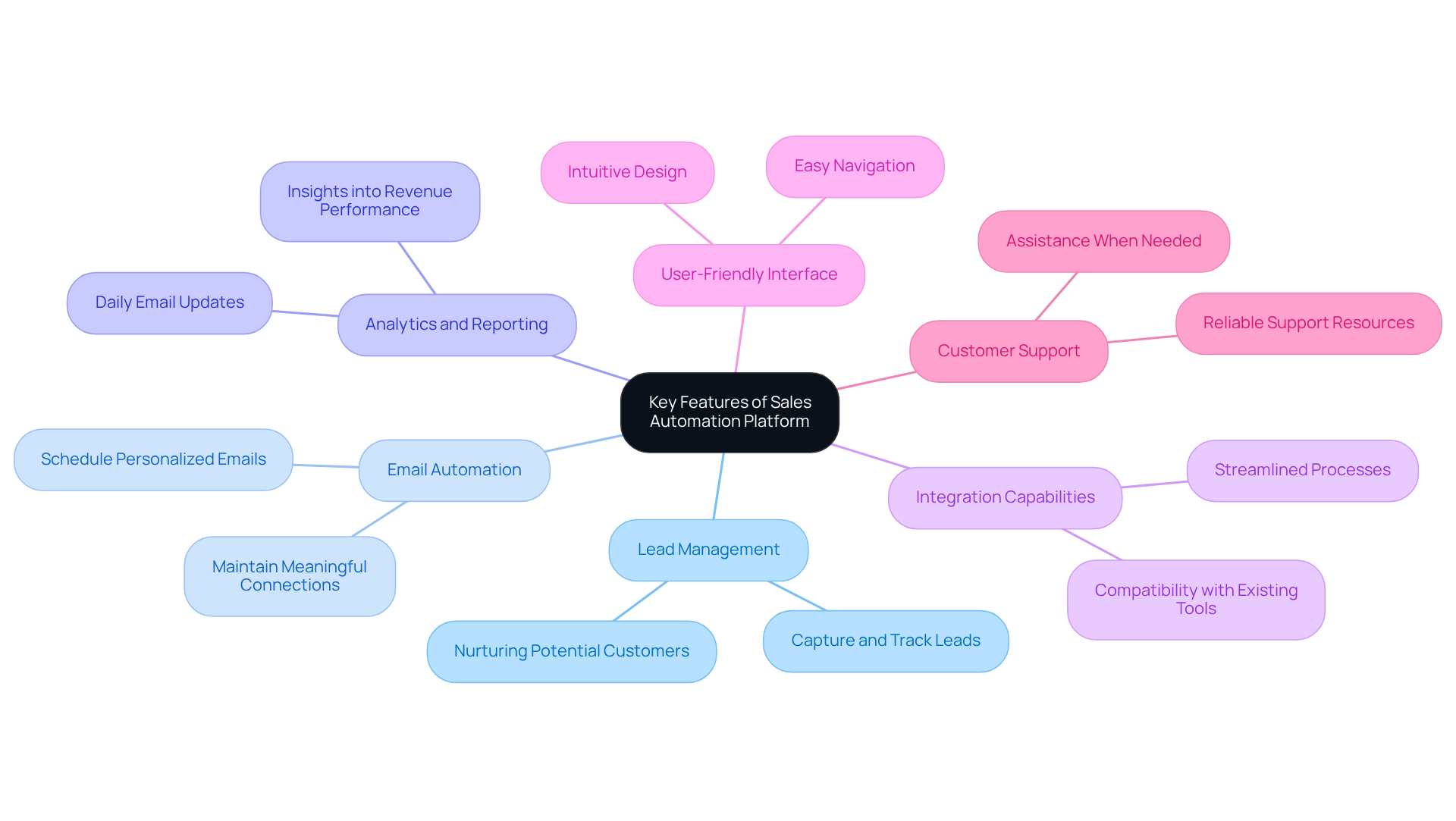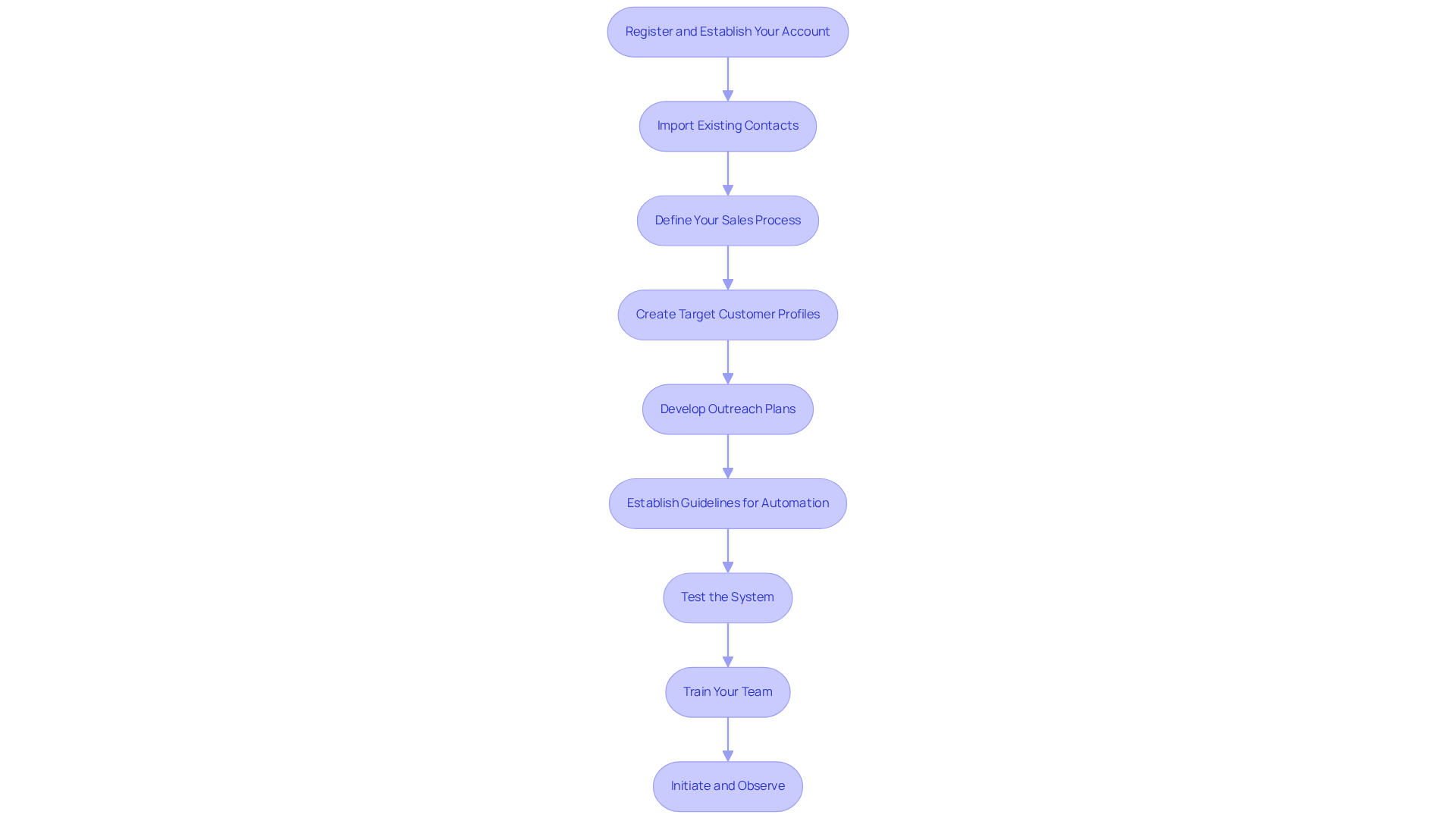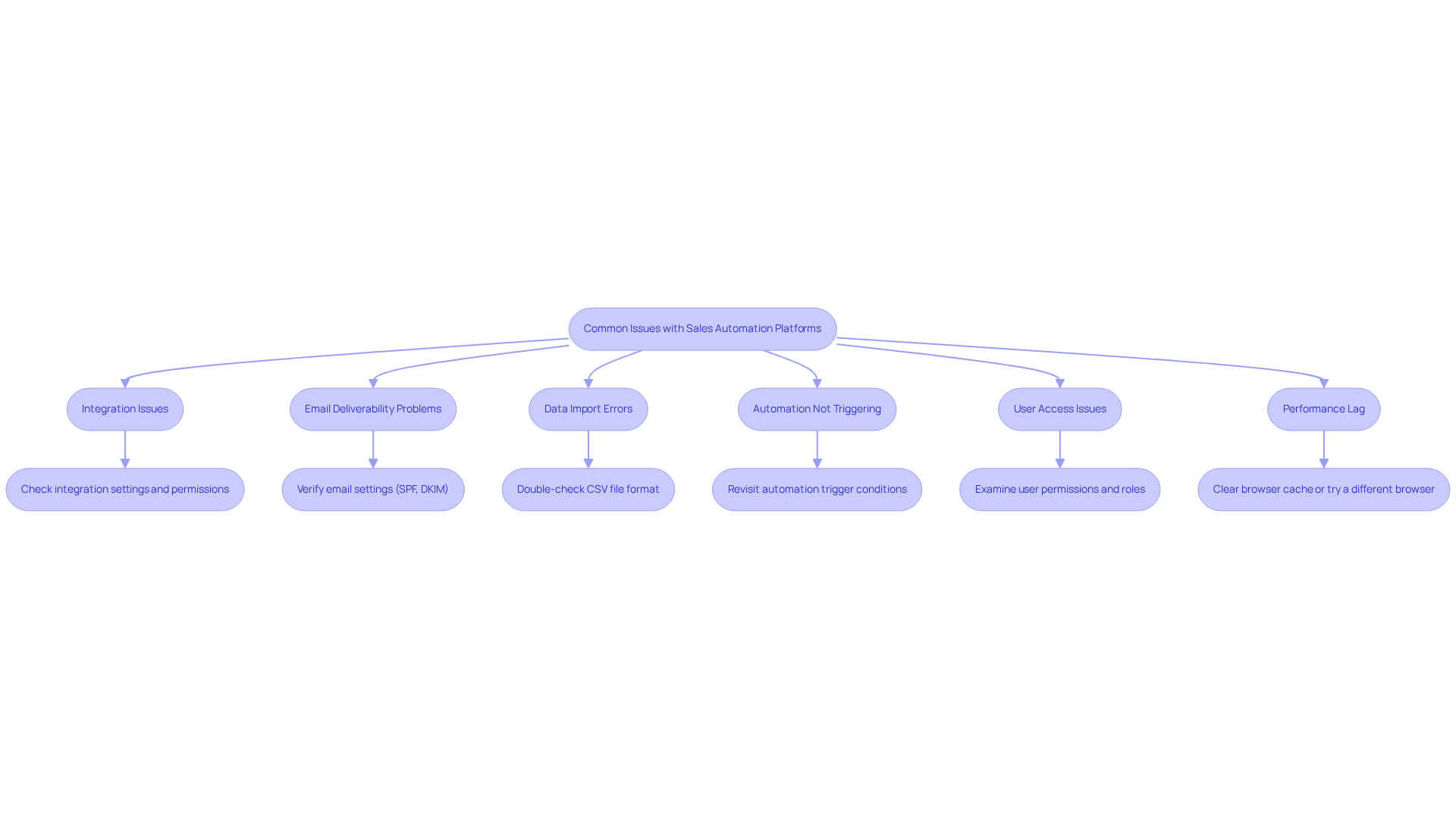Overview
This article is dedicated to helping small businesses effectively master their sales automation platforms. We understand the challenges you face, and automating your sales processes can significantly enhance both efficiency and revenue.
To support you on this journey, we outline key features to consider when selecting a sales automation tool. Additionally, we provide a step-by-step implementation guide and address common troubleshooting issues. Our aim is to ensure that you can navigate and leverage this technology with confidence, paving the way for your growth and success.
Introduction
In today's competitive market, we understand that small businesses are constantly looking for ways to streamline operations and enhance efficiency. Sales automation platforms stand out as essential tools, allowing owners to automate repetitive tasks, manage leads, and analyze customer interactions effectively. Yet, the challenge remains: how can small businesses choose the right platform and implement it successfully?
This guide provides a comprehensive roadmap for mastering sales automation, ensuring that every step you take leads to increased productivity and revenue. Together, we can navigate this landscape to unlock your growth potential.
Define Sales Automation and Its Importance for Small Businesses
A sales automation platform is a powerful ally for small business owners, simplifying repetitive tasks in the selling process, such as lead generation, follow-ups, and data entry. We understand the challenges you face, and this technology can significantly reduce manual effort, allowing you to focus on what truly matters—your strategic initiatives. By automating these processes, you can enhance efficiency, minimize human error, and ultimately increase your revenue.
Consider using a sales automation platform like Wayy.ai, which not only streamlines your sales efforts but also analyzes customer information and behaviors. This capability enables timely interactions with prospects, a crucial factor in boosting your conversion rates. Imagine receiving daily email updates with key metrics that show you exactly what’s working. You’ll gain insights into:
- How many leads were reached
- Who expressed interest
- How your conversion rates are evolving
In today’s competitive landscape, effectively leveraging a sales automation platform can distinguish your business, positioning you for sustainable growth. Together, we can navigate these challenges and seize opportunities that .
![]()
Identify Key Features to Look for in a Sales Automation Platform
We understand that small business owners face many challenges when selecting a sales automation platform. It’s essential to look for several key features that can truly make a difference:
- Lead Management: Look for the ability to capture, track, and manage leads efficiently. This is crucial for nurturing your potential customers.
- Email Automation: Seek tools that allow you to schedule and send personalized emails to prospects, helping you stay connected in a meaningful way.
- Analytics and Reporting: Gain insights into revenue performance, conversion rates, and customer engagement metrics. With Wayy.ai, you can receive that provide key metrics on how many leads were reached, who showed interest, and how conversion rates are improving. This empowers you to enhance your sales performance effectively.
- Integration Capabilities: Ensure compatibility with your existing tools and software, such as CRM systems, to streamline your processes.
- User-Friendly Interface: An intuitive design is vital. You want a system that allows you to navigate easily without extensive training, making your experience smoother.
- Customer Support: Access to reliable support resources is essential. You deserve assistance whenever issues arise, ensuring you never feel alone in your journey.
By concentrating on these attributes, you can confidently select a system that not only addresses your current requirements but also adapts to your growth. Together, we can achieve success and create a brighter future for your business.

Implement Your Sales Automation Platform: A Step-by-Step Guide
To implement your sales automation platform effectively, let's take this journey together by following these thoughtful steps:
- Register and Establish Your Account: Begin by creating an account on the service you’ve chosen. Take your time to follow the prompts and set up your profile and preferences in a way that feels right for you.
- Import Existing Contacts: Upload your current contact list to the system. Most tools make it easy to import data from CSV files or directly from your CRM, so you can start with what you already have.
- Define Your Sales Process: Take a moment to outline your sales process, including stages from lead generation to closing. This thoughtful approach will help you set up the system to align with your unique workflow.
- Create Target Customer Profiles: Utilize the platform's features to build detailed profiles of your ideal customers. Consider their demographics, interests, and behaviors to create a holistic view that guides your outreach.
- Develop Outreach Plans: Design tailored outreach strategies for different customer segments. This ensures your communications are not only relevant but also impactful, making your customers feel valued.
- Establish Guidelines for Automation: Configure rules for follow-ups, reminders, and lead nurturing. This will help you engage with prospects in a timely manner, showing them that you care about their journey.
- Test the System: Before launching fully, take the time to perform tests. Verify that all features are operating correctly and that the processes function as intended, giving you peace of mind.
- Train Your Team: Offer training sessions for your group to familiarize them with the system and its features. This ensures everyone is aligned and feels confident moving forward together.
- Initiate and Observe: Once everything is set up, start your revenue enhancement initiatives. Use the system's analytics tools to track results, allowing you to celebrate successes and make adjustments as needed.
By following these steps, you’re not just implementing a sales automation platform; you’re nurturing your business's growth with care and intention.

Troubleshoot Common Issues with Sales Automation Platforms
Even with the best sales automation platform, it's common to encounter challenges that can feel overwhelming. We understand your concerns, and we're here to help you navigate these issues effectively. Here are some common problems you might face and how to troubleshoot them:
- Integration Issues: If your system isn't syncing with your CRM or other tools, take a moment to check the integration settings. Ensure that all necessary permissions are granted, so everything works seamlessly.
- Email Deliverability Problems: Are your emails not reaching prospects? It's essential to verify your email settings, including SPF and DKIM records, to enhance deliverability and ensure your messages land in the right inboxes.
- Data Import Errors: If contacts aren’t importing correctly, double-check that your CSV file is formatted according to the system's specifications. This small step can make a significant difference.
- Automation Not Triggering: If your automation rules aren’t functioning as expected, revisit the conditions set for triggering actions. Make sure they align with your sales process for optimal performance.
- User Access Issues: If team members are having trouble accessing the system, examine user permissions and roles. Confirm that everyone has the required access rights to contribute effectively.
- Performance Lag: If the platform feels sluggish, try clearing your browser cache or accessing it from a different browser or device. A fresh start can often resolve performance issues.
By proactively addressing these challenges, you can maintain a smooth operation of your sales automation platform efforts. Together, we can work through these challenges and in your business.

Conclusion
Embracing a sales automation platform is essential for small businesses looking to streamline their processes and enhance growth. By automating repetitive tasks, you can focus on strategic initiatives that drive revenue and improve customer interactions. This technology not only reduces manual effort but also empowers you to leverage data effectively, ultimately positioning your business for sustainable success in a competitive marketplace.
This article delves into the critical aspects of sales automation, highlighting its importance, key features to consider, and a step-by-step guide for implementation. From understanding the benefits of lead management and email automation to troubleshooting common issues, you can navigate the complexities of sales automation with confidence. The insights provided underscore the necessity of selecting the right tools and features to meet your unique business needs, ensuring a smoother transition into automated processes.
In conclusion, the journey toward mastering sales automation is not just about adopting new technology; it’s about transforming how your business operates and engages with customers. We encourage you to take proactive steps in implementing these systems, continuously refining your approach to maximize efficiency and impact. By doing so, you can unlock the full potential of your sales processes, paving the way for long-term success and growth together.
Frequently Asked Questions
What is sales automation?
Sales automation refers to the use of technology to streamline and simplify repetitive tasks in the selling process, such as lead generation, follow-ups, and data entry.
Why is sales automation important for small businesses?
Sales automation is important for small businesses because it reduces manual effort, enhances efficiency, minimizes human error, and ultimately increases revenue, allowing business owners to focus on strategic initiatives.
How can a sales automation platform like Wayy.ai benefit a small business?
A sales automation platform like Wayy.ai can streamline sales efforts, analyze customer information and behaviors, and enable timely interactions with prospects, which is crucial for boosting conversion rates.
What kind of insights can a sales automation platform provide?
A sales automation platform can provide insights into how many leads were reached, who expressed interest, and how conversion rates are evolving.
How can sales automation help in a competitive landscape?
Effectively leveraging a sales automation platform can distinguish a business in a competitive landscape, positioning it for sustainable growth by enhancing its ability to navigate challenges and seize opportunities.




